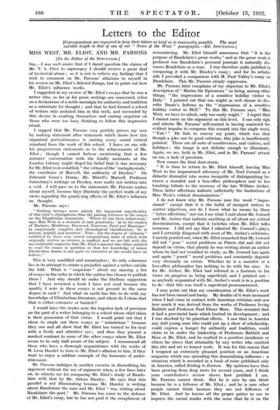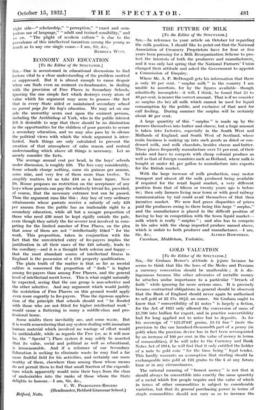Letters to the Editor
[Correspondents are requested to keep their letters as brief as is reasonably possible. The most suitable length is that of one of our " News of the Week " paragraphs.—Ed. SPECPATO 2. I
MISS WEST, MR. ELIOT, AND MR. PARSONS
[To the Editor of the SPECTATOR.]
Sut,—I was well aware that if I dared question the claims of Mr. T. S. Eliot to supremacy I should receive a great deal
. of hysterical abuse ; so it is not to relieve my feelings that I wish to comment on Mr. Parsons' allusions to myself in his review on Mr. Eliot's Selected Essays, but to point out how
Mr. Eliot's influence works.
I suggested in my review of Mr. Eliot's essays that he was a writer who, so far as his prose writings are concerned, relies on a declaration of a noble nostalgia for authority and tradition as a substitute for thought ; and that he had formed a school of writers who imitated him in this trick, and succeeded by this device in exalting themselves and casting suspicion on those who were too busy thinking to follow this impressive ritual.
I suggest that Mr. Parsons very prettily proves my case
by making statement after statement which shows how this organized pretentiousness is ousting every sound critical
standard from the work of this school. I leave on one side his preposterous statements as to the achievements of Mr. Eliot ; though I cannot forbear mentioning that a few minutes' conversation with the kindly assistants at the London Library might dispel his belief that it was necessary for Mr. Eliot to re-establish " the virtues of the ' metaphysicals,' the excellence of Marvell, the authority of Dryden." Sir Edmund Gosse's Donne, Mr. Birrell's Marvell, Professor Saintsbury's writings on Dryden, were really not written into a void. I will pass on to the statements Mr. Parsons makes about myself, because they illustrate the perfect truth of my views regarding the paraly sing effects of Mr. Eliot's influence on thought.
• Mr. Parsons says :
" Nothing betrays more plainly the ingenuous superficiality of this critic's objurgations than the passing reference to the essays on the Elizabethan dramatists. ' Where he has been industrious,' says Miss West in a moment of rash generosity, as in the studies of Marlowe, Middleton, Heywood, Tourneur, Ford and Massinger ' (a suspiciously complete and chronological classification) he is serious, helpful, and sensitive.' True ; but the degree of industry' exhibited by these very varied compositions, some of which were originally written as reviews, is marked, and we are left with the uncomfortable suspicion that Mr. Eliot's assessor has either omitted to read the essays in question or that her knowledge of minor Elizabethan drama is not quite so extensive as she would have us believe."
This is very muddled and meaningless ; its only coherence lies in its attempt to create a prejudice against a writer outside the fold. What is " suspicious " about my naming a list of essays in the order in which the author has chosen to publish them ? And why should he make the libellous suggestion that I have reviewed a book I have not read because the quality I note in these essays is not present to the same degree in each ? And what on earth has this to do with my knowledge of Elizabethan literature, and where do I claim that that is either extensive or limited ?
I would have the reader note the hopeless lack of precision on the part of a writer belonging to a school whose chief claim is their possession of that virtue. I would point out that I chose to single out these essays as " industrious " because they one and all show that Mr. Eliot has turned to his text
with a lively and attentive eye ; and thus they present a marked contrast to some of the other essays where Mr. Eliot seems to be only half aware of his subject. I recommend all those who have a thorough acquaintance with the works of
M. Leon Daudet to turn to Mr. Eliot's allusion to him, if they want to enjoy a sublime 'example of the humours of under- statement.
Mr. Parsons indulges in another exercise in discrediting his opponent without the use of argument when, a few lines later on, he attacks me for comparing Mr. Eliot's study of Baude- Jaire with that by Mr. Aldous Huxley. He says that this parallel is not illuminating because Mr. Huxley is writing about Baudelaire the man and Mr. Eliot " was writing about. Baudelaire. the. poet." Mr. Parsons has come to the defence' of Mr.. Eliot's essay, but he has not paid it the compliment of remembering. Mr. Eliot himself announces that " it is the purpose of Baudelaire's prose works," and as the prose work it prefaced was Baudelaire's personal journals it naturally dis- cusses Baudelaire as a man. I was therefore quite justified in comparing it with Mr. Huxley's essay ; and for its artistic side I provided a comparison with M. Paul Valery's essay on Baudelaire. This Mr. Parsons simply suppresses.
Mr. Parsons later complains of my objection to Mr. Eliot's description of " Marius the Epicurean " as being, among other things, " the impressions of a sensitive holiday visitor to Italy." I pointed out that one might as well choose to des- cribe Dante's Inferno as the " impressions of a sensitive holiday visitor to Hell." To this Mr. Parsons says, " 1Wiss West, we have to admit, only too easily might." I regret that I cannot carry on the argument on this level. I can only sigh and admire Mr. Parsons' self-control in having mastered his evident impulse to compress this remark into the single word, " Yah ! " He fails to convey my point, which was that though a joke can be good criticism, this joke is insufficiently pointed. There are all sorts of sensitiveness, and visitors, and holidays ; the image is not definite enough to illuminate. Again, we see, both in Mr. Eliot, and in Mr. Parsons attack on me, a lack of precision.
Now comes the final dust-storm.
" It is time to return to Mr. Eliot himself, leaving Miss West to her impassioned advocacy of Mr. Noel Coward as a didactic dramatist (she seems incapable of distinguishing be-. tween a moralist and a box-office philosopher) and to her touching tribute to the memory of the late William Archer. These latter affections indicate sufficiently the limitations of Miss West's critical discrimination."
I do not know why Mr. Parsons uses the word " impas- sioned " except that it is the habit of inexpert writers to scatter adjectives, nor do I know what he means by these " latter affections," nor can I see what I said about Mr. Coward and Mr. Archer that indicate anything at all about my critical discrimination, except that it twitches when Mr. Eliot talks nonsense. I did not say that I admired Mr. Coward's plays„ and I certainly disagreed with most of Mr. Archer's criticisms. I merely pointed out, when Mr. Eliot remarked that Mr. Coward did not " pose " moral problems as Pinero did and did not depend on virtue, that plainly he was writing about an author whom he had not troubled to study, as Mr. Coward has again, and again " posed " moral problems and constantly depends very obviously on virtue. Whether he is a moralist or a box-office philosopher has nothing to do with the case. As for Mr. Archer, Mr. Eliot had referred in a footnote to his views on progress as being superficial, and I pointed out— as anybody acquainted with Mr. Archer's work is in a position to do—that this was itself a superficial pronouncement.
I may point out that my consideration of Mr. Eliot's work has not been casual and hasty. My doubts of it were increased when I had come in contact with American criticism and saw how much it was derived from the works of Professor Irving Babbitt and Professor Paul Elmer More. This revealed that it had a provincial basis which limited its development ; and I was shocked by its practical effects. I saw that in America any dull young man who could put up a show of scholarship, could express a hunger for authority and tradition, could claim to be under the leadership of Professors Babbitt and More or Mr. Eliot, and be exalted to a position (academic or other) far above that attainable by any writer who omitted this rite and set to honest work. It was for this reason that. I resigned an extremely pleasant position on an American magazine which was spreading this demoralizing influence : a situation which is recorded in a book of mine published only in America, called Ending in Earnest. My opinions have thus been growing from deep roots for several years, and I think your contributor's review shows how justified I am. Mr. Parsons cannot think. But he is sure he can think because he is a follower of Mr. Eliot ; and he is sure other people cannot think because they are not followers of Mr. Eliot. And he knows all the proper patter to use to impress the casual reader with the sense that he is on the right side—" scholarship," " perception," " exact and scru- pulous use of language," " adult and trained sensibility," and ;..o on. " The plight of modern culture " is due to the prevalence of this intellectual tarantism among the young as much as to any one single cause.—I am, Sir, &c.;
REBECCA WEST.



























































 Previous page
Previous page